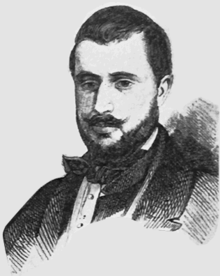Dimitrie Brătianu
Dimitrie (Dumitru) Constantin Brătianu (* 1818 in Piteşti , Principality of Wallachia , today: Romania ; † June 4, 1892 in Bucharest ) was a Romanian politician of the National Liberal Party ( Partidul Național Liberal ) , who was Prime Minister of the Kingdom of Romania in 1881 .
Life
Studied in France, Revolution 1848 and diplomat
Brătianu, son of Constantin "Dincă" Brătianu , was the younger brother of Theodor Brătianu (1812-1884) and the older brother of longtime Prime Minister Ion C. Brătianu as well as uncle of Ion's sons Ion IC Brătianu and Vintilă Brătianu , who later also took office of the Prime Minister. After attending the Colegiul Național "Sfântul Sava" in Bucharest in 1835, he began studying medicine at the University of Paris , but in 1836 he switched to studying at the École normal supérieure . During this time he joined the Society for the Education of the Romanian People (Societatea pentru învățătura poporului român) in August 1839 and finally began in 1841 to study law at the University of Paris. During this time he attended the lectures of the professors Jules Michelet and Edgar Quinet, who taught at the Collège de France , and in December 1845 became a member of the Society of Romanian Students of Paris (Societății studenților români de la Paris) and in September 1847 of the Însocierea Lazariană , which campaigned for the promotion of education in the principalities of Moldova and Wallachia . During his stay in France , he was also involved as a Freemason and was a member of the Masonic lodges L'Athenes des Etranges and La Rose du parfait silence .
After his return to Romania in April 1848, Brătianu took part in the Romanian Revolution of 1848 and became a member of the Revolutionary Committee of Great Wallachia on May 10, 1848 . As such, he conducted negotiations as a diplomatic agent with the Austro-Hungarian government in Vienna and Budapest before finally going into exile after the failure of the revolution. He was one of the co-founders of the Central Democratic European Committee founded in London on September 11, 1851, and returned to Romania from exile in 1857, where he became a member of the Elected Assembly of the Principality of Wallachia on January 24, 1859. In the following years he was the envoy of Alexandru Ioan Cuza , the first prince of Moldavia and Wallachia.
Bucharest mayor, minister and prime minister 1881
After the formal unification of the two principalities of Moldavia and Wallachia to form the Principality of Romania on December 24, 1861, which he strongly supported, on March 1, 1866, he succeeded Constantin Iliescu as Mayor of Bucharest . He held this office until his replacement by Panait Costache on March 9, 1867, and in 1866 also served as Vice-President of the Constituent Assembly and as envoy to Prince Carol I , who succeeded Alexandru Ioan Cuza in 1866. In the government of Prime Minister Constantin A. Crețulescu he held the office of Minister for Religion and Public Education (Ministru Cultelor și Instrucțiunii Publice) between March 1 and August 5, 1867 . At the same time he became Minister of Agriculture, Minister of Commerce and Minister of Public Works (Ministerul Lucrărilor Publice) on March 1, 1867 and held these offices until November 13, 1867 in the government of Prime Minister Ștefan Golescu . As a representative of established in 1875 the National Liberal Party ( Partidul Naţional Liberal ) , he was initially a member of the Chamber of Deputies (Adunarea Deputaţilor) and then the Senate (Senatul) before it between October 1878 and April 1881 Extraordinary Envoy and Plenipotentiary Minister in the Ottoman Empire in Was Constantinople .
On April 10, 1881 Brătianu succeeded his brother Ion C. Brătianu as Prime Minister (Președinții Consiliului de Miniștri) of the Kingdom of Romania , which was proclaimed on March 26, 1881, and held this office until his replacement by Ion C. Brătianu on June 8, 1881. In his cabinet from April 10 to June 8, 1881, he also took over the post of Foreign Minister (Ministru Afacerilor Externe) . He then served as President of the Chamber of Deputies between 1881 and 1882.
Brătianu, who until September 26, 1891 Editor of the June 17, 1882 newspaper Naţiunea was founded after leaving the Partidul Naţional Liberal together with Lascar Catargiu and Gheorghe Vernescu the Liberal Conservative Party (Partidul Liberal Conservator) , dedicated to the Radical Party of United Opposition (Opoziția Unită) led by Gheorghe Panu against the government led by his brother Ion C. Brătianu.
Dimitrie's eldest son, Constantin Ion Brătianu (1844-1910), was a scientist and became a general. His second son, Dan Dimitrie Brătianu (1866–1899), was a member of the National Liberal Party, as was his third son, Constantin Dimitrie Brătianu (1871–1934). Dimitrie's nephew Constantin Ion Constantin Brătianu , another son of Ion C. Brătianu, was just as politically active as his brothers Ion IC Brătianu and Vintilă Brătianu and Dimitrie's great-nephew Gheorghe Brătianu , a son of Ion IC Brătianu. Dimitrie's grandson Bebe Brătianu (the son of General Constantin Ion Brătianu) was the last General Secretary of the National Liberal Party until 1947.
Web links
- Entry in rulers.org
- CTITORI AI ROMÂNIEI / 150 de ani de la Unirea Principatelor Române (article on the 150th anniversary of the Principality of Romania)
Individual evidence
| personal data | |
|---|---|
| SURNAME | Brătianu, Dimitrie |
| ALTERNATIVE NAMES | Brătianu, Dimitrie Constantin (full name); Brătianu, Dumitru (alternative first name); Brătianu, Demeter (alternative first name) |
| BRIEF DESCRIPTION | Romanian politician, Prime Minister |
| DATE OF BIRTH | 1818 |
| PLACE OF BIRTH | Piteşti , Principality of Wallachia , today: Romania |
| DATE OF DEATH | June 4, 1892 |
| Place of death | Bucharest |
